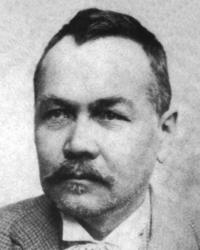The page of Hviezdoslav, Pavol Országh, English biography
Biography
During the latter three decades of the century the leading poet was Pavol Országh Hviezdoslav (1849-1921), who worked as a lawyer, mostly in Dolný Kubín, east of Martin. His most celebrated longer narrative poem is Hájnikova žena (The Gamekeeper's Wife, 1884-6) - the story of a young gamekeeper Michal Čajka and his wife Hanka, who kills her would-be rapist, the morally corrupt aristocrat Artuš Villáni. The centre of the poem is the upland life and celebration of its freedom. The seasons are portrayed, local scenes and human activities integrated with the life of the forest (fetching of water, tree felling, raspberry picking, stag hunt, the night stars, the woodland torrent like the crashing of chains "which however does not bind, does not fetter legs, or spirit, does not confine in its circle the spirit which flew like an eagle in between the hills, to sate itself with freedom, and feel that it is spirit." Hviezdoslav is somewhat of a cosmopolitan (but also patriotically Slovak) Parnassist. Sometimes diction is all: he enriches the poetic language with dialect expressions and neologism, pursuing eloquent texture, even at the cost of textual obscurity. His Krvavé sonety (Sonnets of Blood, 1919) express bitterness about the madness of the war, which tramples on his struggling optimism; he doubts the future of man, and God's justice; but ends on a note of optimistic longing.




